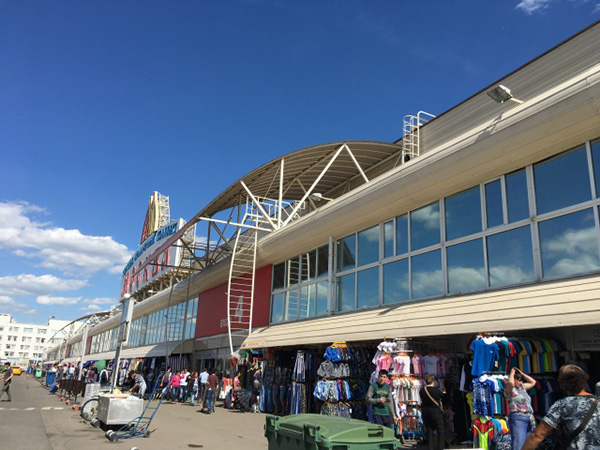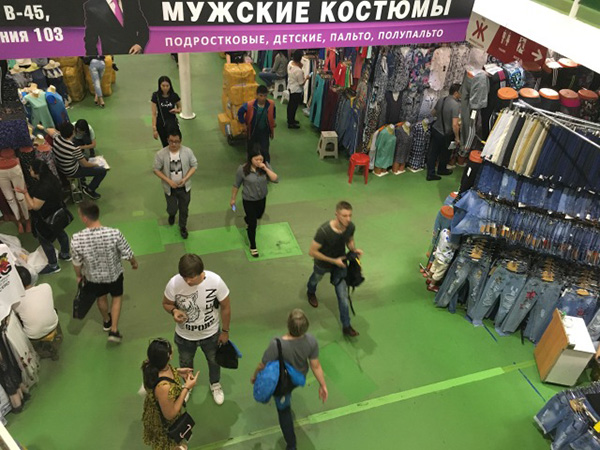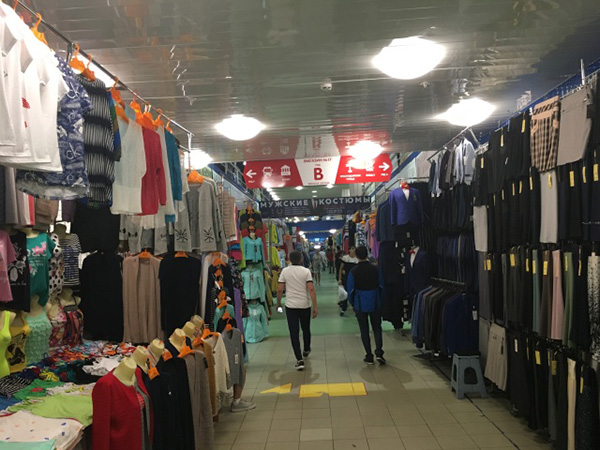Chinese businessmen in Russia: from the bitter experience of the ruble crash to "earning 100 thousand dollars in ten minutes"
"How did the ruble depreciate again recently?" Xu Xiujuan, a female boss from Wenzhou, Zhejiang Province, is a little anxious in a shop that wholesales denim clothes in Blinault market.

Moscow Liu Blinault Market. The pictures in this article are all from Xinhua News Agency.
For Chinese businessmen in LiuBlinault market, keeping a close eye on the ruble exchange rate is a "compulsory course" every day. A few years ago, the injury caused by the ruble’s plunge has not been completely healed, and how to get out of the stormy big market is a new problem before us.
Wake up, the ruble is worthless.
Liu Blinault Market is the largest wholesale market for daily necessities such as clothes, shoes and hats, with about 6,000 stalls, one third of which are run by Chinese businessmen.
The stalls are crowded and the middle aisle is narrow. From time to time, porters with Central Asian faces push carts and shout "Excuse me".
Due to the underdeveloped light industry in Russia, Chinese businessmen have flocked to the Far East, Moscow and other places to seek gold since the 1990s, and "profiteering" once became synonymous with Chinese businessmen in Russia. From 2000 to 2008, the Russian economy entered a period of rapid growth, and the business of Chinese businessmen was also smooth.
After Russia was hit by the global financial crisis in 2008, the "collecting money" model of Chinese businessmen "earning a Mercedes-Benz a week" became a memory. In 2008 and 2014, the ruble plummeted twice, which brought a serious blow to Chinese businessmen.
Zheng Riwei and Hu Dongling run down jacket export business in Russia.Hu Dongling said that at that time, the exchange rate of the ruble fluctuated violently, and the ruble earned by selling goods could not be immediately exchanged for RMB or US dollars and sent back to China. Often, when I woke up, I found that the ruble I held was even less valuable. "I feel like I’m sleeping in the presidential suite every day, and all the money I lost overnight is worth the room money."
Yan Linfu, a businessman from Taizhou, Zhejiang Province, said that in 2015, the ruble exchange rate fluctuated too much, and product pricing was difficult, just like speculating in futures. Businesses engaged in non-governmental trade with Russia have lost more than 60%, and few have made profits.

Moscow Liu Blinault market.
Compared with the impact of the two rouble crashes, the Chinese businessmen have a more painful memory of the closure of the Cerchi Zovsky market.
In 2008, under the depression of Russian domestic economy, the boss of a big market went to Turkey to invest a lot of money and angered the Kremlin. The Russian government seized and destroyed the goods in the big market on the grounds of cracking down on "gray customs clearance", and then closed the market indefinitely. Tens of thousands of Chinese businessmen lost as much as $2 billion.
Due to the particularity of the Russian market, the problem of informal "grey customs clearance" has not been solved, and Chinese businessmen still face risks.
Yan Linfu said that the owner of Liu Blinault Market is a pair of Jewish brothers, and most Chinese businessmen pay management fees to them. Under their protection, Russian customs and tax authorities turn a blind eye to the "gray customs clearance". The "grey customs" cost is low, which lowers prices and meets the needs of low-income people in Russia. The special problems in this specific period can only be solved slowly.
Russia has a large market and a low threshold, and there is a rigid demand for clothing and other department stores, which is the reason why many Chinese businessmen are attached to this land. However, this market is full of troubles, so many merchants in Blinault have the mentality of taking a gamble and taking a chance.
Double 11 broke $100,000 in 10 minutes.
Zheng Riwei said that hardships gave birth to opportunities, and the blow in Russia prompted him to change his mind and try to cooperate with AliExpress, from wholesale to retail.
During AliExpress’s overseas "double 11" event last year, the ICEbear brand of Beijing Riwei Clothing Company, founded by Zheng Riwei, became the champion of clothing sales, with its revenue exceeding 100,000 US dollars in 10 minutes and 200,000 US dollars in half an hour.
On the AliExpress website, the fans of the ICEbear store have a collection of more than 370,000. On the sales page of a white women’s down jacket, buyers left thousands of messages, most of which praised the down jacket for its good quality and fast delivery.
According to Zheng Riwei, these down jackets specially for the Russian market are thicker than ordinary down jackets, and they have waterproof function, which can not only resist the cold weather in Russia, but also cope with the water droplets falling after melting snow.
In the view of Gou Shanchao, director of e-commerce operation of Riwei Clothing Company, cooperation with AliExpress has brought at least two major benefits to the company.
The first is to improve brand awareness. After joining the cross-border e-commerce platform, the company directly faces consumers, and customers’ recognition of the brand is improved. There are many Russian "loyal fans" who will take the initiative to ask when the new model will be available.
Second, products can be optimized in time according to customers’ needs. On the e-commerce platform, the company can get customer feedback at any time. If the buyer says there is something wrong with the version of this batch of clothes, the company can change it in time in the next batch of goods.
Gou Shanchao said that the company joined the cross-border e-commerce platform in 2014 and just started to deliver goods from China, and the arrival time was at least one month. In 2016, the company implemented overseas warehouses. First, large quantities of goods were sent to warehouses in Moscow. After customers placed orders, they were delivered directly from overseas warehouses, and the goods would arrive the next day in Moscow and nearby areas.
Since 2015, the Russian economy has fallen into negative growth, the people are not well off, and the price/performance ratio of goods is higher. With the help of cross-border e-commerce platform, some Chinese businessmen cut off the intermediary channels and directly connected with Russian consumers, so that consumers can buy high-quality goods at lower prices.
Going out of the big market, from "grey customs" to "white customs"
As the Secretary-General of Wenling Chamber of Commerce in Moscow (China), Yan Linfu is quite familiar with the living conditions of Chinese businessmen in Russia. Going out of the big market is his advice to Chinese businessmen.

Yan Linfu said that he is now "walking on two legs", not only doing wholesale in Liu Blinault market, but also setting up a company to do retail in Russia. The company opened a flagship store in the bustling section of Moscow and opened up online sales channels.
The sales model of Liu Blinault big market is to wait for customers to come to the door. Because of the small market scope and repeated customer resources, the vicious door-to-door bargain is inevitable. Yan Linfu believes that Chinese businessmen need to go out of LiuBlinault, face consumers directly and try online to offline.
In recent years, e-commerce has developed rapidly in Russia, and a large number of China goods with high quality and low price have directly reached Russian consumers through cross-border e-commerce platforms such as AliExpress.
As for the influence of cross-border e-commerce on the wholesale business, the merchants in LiuBlinault are unable to agree. Some Chinese businessmen believe that cross-border e-commerce has little impact on Liu Blinault’s business due to different groups of people. Others hold the opposite opinion that cross-border e-commerce leads to price transparency and has a great impact on wholesale business.
Alibaba once held a mobilization meeting in Yabao Road, Beijing to encourage businesses to try e-commerce and set up training courses. Many people tried, but few succeeded.
The reason is that Gou Shanchao believes that, first of all, businesses that trade with Russia do not pay enough attention to e-commerce. Many people are used to making big money by wholesale, while e-commerce earns small money every time; Secondly, many Chinese businessmen are born in entities, do not understand e-commerce, and have no professionals around them.
Zheng Riwei said that at present, the company’s delivery through the e-commerce channel is all "white customs", and all the procedures are legal from domestic registered companies to foreign registered companies. He suggested that Chinese businessmen bravely try to organize formal business and gradually turn "grey customs" into "white customs".
Liu Wei, director of AliExpress Russian Station of Alibaba, said that China merchants who have branches and stocks in like Riwei Clothing belong to the partners of AliExpress localization business. This year is the first year of AliExpress’s localization business. At present, we are still carrying out infrastructure work in logistics and market. We hope to cooperate with more merchants in Yabao Road and Liu Blinault when conditions are ripe.
In the long run, normalization and branding are the general trend of Sino-Russian non-governmental trade. E-commerce can provide an opportunity for the transformation of Sino-Russian non-governmental trade and force Chinese businessmen to standardize their operations.
"Only through e-commerce can we truly make the brand bigger. The company not only has more confidence in deepening the Russian market, but also sets a goal of going global," Zheng Riwei said.
(The original title is "Earn $100,000 in 10 minutes! Chinese actually does business like this in Russia ")